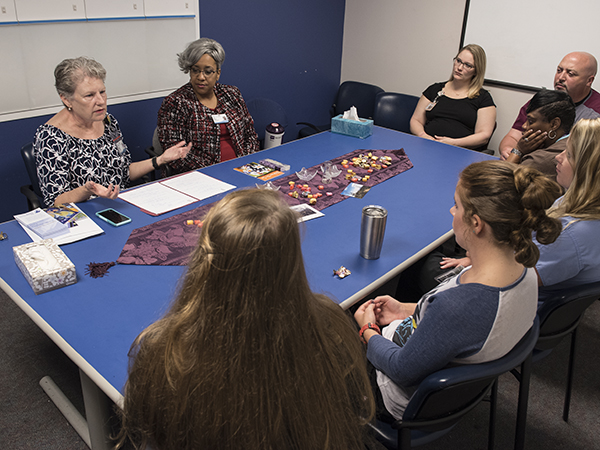Code You: chaplains, colleagues help UMMC's healers find healing

Published in News Stories on May 11, 2017
Seed-sized beads drop in a bottle as tears fall.
The beads are a personal ritual of chaplain Linda McComb, a way to cope with the sadness and grief that can be an inherent part of working in a hospital setting. For every sadness, a tiny white bead drops in, and for every time care is offered in a compassionate way, for every time kindness is witnessed, a purple bead joins in.
The result is a mix of beads signifying celebration and pain, said McComb. “It's a visual symbol that life is a mix of joy and sadness. It reminds me of the strength and healing discovered alongside the challenges, suffering and pain.”

McComb passed the beads around a conference room table to nurses having a Code You debriefing session at Batson Children's Hospital. The care team could share feelings, cry and drop more beads into the bottle.
“Code You started as an idea of our nurse manager of quality, Kristin Dowdy,” said Michelle Welander, chief nursing officer at Batson Children's Hospital. “She wanted to help make employees aware of what's already available within the organization.” Sounding much like an emergency code, Code You is aimed at getting needed help to healers, whether individually or through group debriefings.
“Nurses are working nonstop,” said Doris Whitaker, director of pastoral services at UMMC. “They may have dealt with a child's health crisis in the pediatric intensive care unit or in the Emergency Department, but they don't have time to grieve. It may be difficult for them to take a step back and take a deep breath because they have other patients who need them.”

Horn
Said Kim Horn, a nurse manager in the Surgical ICU, “The sad part is, we have to shift gears very quickly. We have to turn around and admit a patient who has had the blessing of an organ transplant right after we've assisted a family with grieving over a death. Often, it's in the same room.”
She has yet to find “an absolute coping mechanism that works for everyone,” she said. “Everyone is different. Often, we don't cope very well. We end up building a wall between us and our patients, or us and families, so that we aren't emotionally exhausted at the end of the day. There's a fine balance. You have to be able to project caring and empathy, and at the same time you have to protect yourself.”
When there's a death in the ICU, Horn leads her staff in an exercise designed to help them cope. “We pause,” she said. “Everyone stops what they're doing after we call the death, and nobody moves. Nobody talks. It's a reverent pause for us to think about the person and what kind of life they had.
“This helps with processing the loss,” she said. “We have to remind ourselves that it's someone's favorite person lying there.”
Caring and compassion are the calling of nurses, but when the demands of the job and medical crises clash, the result can be professional burnout. There can be feelings of grief when a patient's condition worsens or when a life comes to an end, said Dowdy. “Health care professionals can feel guilty in those situations, wishing they could have done more. Because of who we are and what we do, we all want to fix and heal everything, and it doesn't always happen that way.”
Rarely does a nurse - Horn included - break down on the unit. “We know going into it that you have to keep it together for the families,” she said. “But if a nurse is having a hard time, I pull them aside and let them vent. If it's that bad, I tell them to go home and decompress.”

Sara Black, left, Batson Children's Hospital nurse, listens to fellow nurse Allison Kiss during a Code You debriefing session.
Bailey Dungan, a surgical ICU nurse nearing her second anniversary in the profession, said she uses empathy in nursing. “I try my best to hold it together, but I definitely take it home with me sometimes.”
To get through, “we lean on each other,” said nurse manager Jill Cutrer. “We know when things are starting to look bleak for a patient, and we get the chaplains involved. We know that these families have tough decisions to make, and someone has to help them make those decisions and give them comfort. It's a hard thing for nurses to deal with.”
Children on the hospital's bone marrow unit frequently come to Pam Farris' office in search of toys. Although she doesn't do a lot of bedside care, Farris gets to know each patient in her unit.
“We nurses fight and fight to cure the disease, but we have to recognize the signs to let go,” she said. “It's painful. We have to change on a dime.”
“One thing that's unique to our floor is that our patients stay a lot longer,” said nurse Emily Jeter, who also works in the bone marrow unit. “You develop a bond, even if you try not to.”
It helps her staff to talk about patients they lose, Farris said. “We sit around the table. It's kind of a release.”
Any care team member can call a chaplain, whether it is shortly after a crisis or later. Chaplains can be reached through Contact U via UMMC's intranet.


